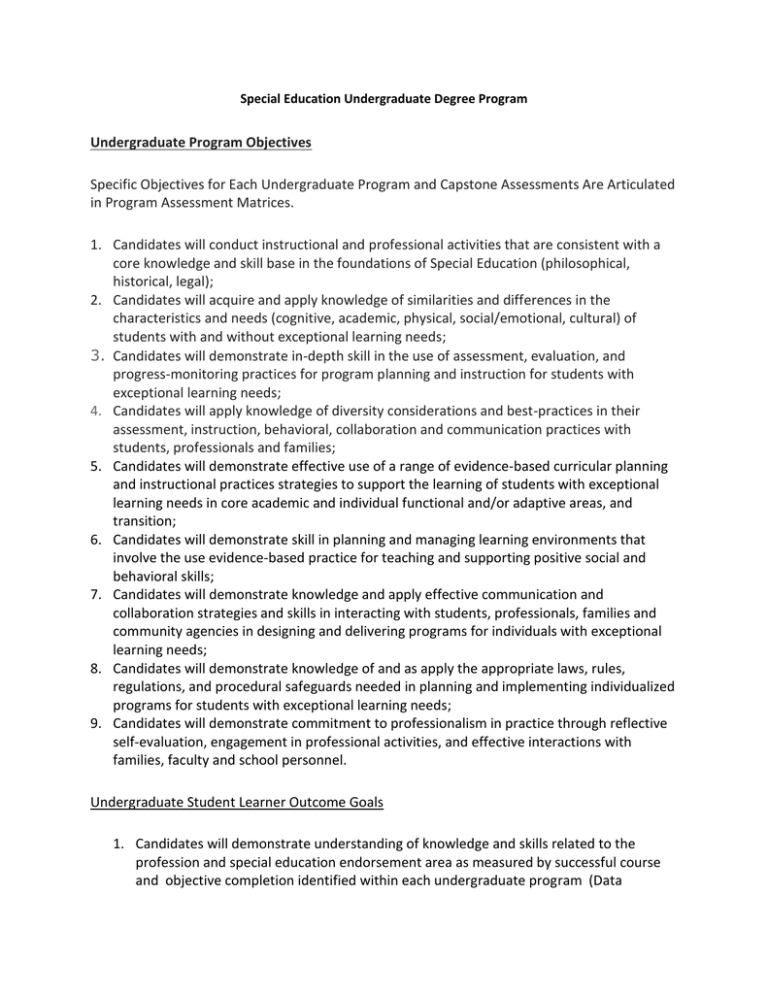Undergraduate Program Objectives in Program Assessment Matrices.
advertisement

Special Education Undergraduate Degree Program Undergraduate Program Objectives Specific Objectives for Each Undergraduate Program and Capstone Assessments Are Articulated in Program Assessment Matrices. 1. Candidates will conduct instructional and professional activities that are consistent with a core knowledge and skill base in the foundations of Special Education (philosophical, historical, legal); 2. Candidates will acquire and apply knowledge of similarities and differences in the characteristics and needs (cognitive, academic, physical, social/emotional, cultural) of students with and without exceptional learning needs; 3. Candidates will demonstrate in-depth skill in the use of assessment, evaluation, and progress-monitoring practices for program planning and instruction for students with exceptional learning needs; 4. Candidates will apply knowledge of diversity considerations and best-practices in their assessment, instruction, behavioral, collaboration and communication practices with students, professionals and families; 5. Candidates will demonstrate effective use of a range of evidence-based curricular planning and instructional practices strategies to support the learning of students with exceptional learning needs in core academic and individual functional and/or adaptive areas, and transition; 6. Candidates will demonstrate skill in planning and managing learning environments that involve the use evidence-based practice for teaching and supporting positive social and behavioral skills; 7. Candidates will demonstrate knowledge and apply effective communication and collaboration strategies and skills in interacting with students, professionals, families and community agencies in designing and delivering programs for individuals with exceptional learning needs; 8. Candidates will demonstrate knowledge of and as apply the appropriate laws, rules, regulations, and procedural safeguards needed in planning and implementing individualized programs for students with exceptional learning needs; 9. Candidates will demonstrate commitment to professionalism in practice through reflective self-evaluation, engagement in professional activities, and effective interactions with families, faculty and school personnel. Undergraduate Student Learner Outcome Goals 1. Candidates will demonstrate understanding of knowledge and skills related to the profession and special education endorsement area as measured by successful course and objective completion identified within each undergraduate program (Data includes: Program Matrices, and Semester Course Completion Data and Other Data Collected by Individual Programs. Programs monitor appropriate entry and exit information). 2. Candidates will successfully apply evidence-based pedagogical, methodological, management and professional knowledge related to students with exceptional learning needs as identified in the endorsement program in diverse and varied authentic fieldbased settings in individualized and group settings. (Data includes: Phase I & 2 practica placement data; Practicum Pass/Failure Rates. Final observation Scores on planning, instruction and management Rubrics from practica; Phase 2 (Through Practica Pass/Failure Rate Data; Final Observation Rubric Score (Planning, Instruction, Management 3. Candidates will engage in ongoing collaboration with faculty, school and community personnel, students and families which demonstrate a knowledge of professional responsibilities, communication, and ethical practice for special educators (Data: Phase 1 and Phase 2: Final Professional Ratings; Student Teaching Final Data: Professionalism) 4. Candidates will sustain dispositions and best-practice knowledge and skills related to the instruction, management, collaboration and diversity of students with exceptional learning needs in school settings throughout the teacher preparation program (Measured by TWS Items in the 1st Student Teaching Placement; Final Student Teaching Assessment). Fall 2010



